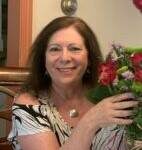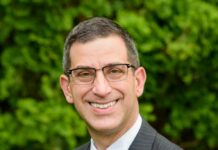
Rabbi Beth Kalisch
Parashat Lech L’cha
The story of the Great Flood was last week’s Torah portion, not this week’s. But as a congregational rabbi, I have spent this week talking to people about the storms that are still raging: storms on college campuses, in fraught workplaces and on social media; storms of loved ones in Israel who are in safe rooms, on reserve duty and at so many funerals.
We are grieving the dead; we are still in shock from the barbarism of the massacre. We are desperately telling the stories of hostages and praying and advocating for their safe return. We are heading to rallies to support Israel’s right to defend itself against terrorism and also worrying about innocent civilians in Gaza. We are feeling abandoned by too many non-Jewish neighbors we considered friends. Our voices are catching when we speak aloud the word “pogrom.” We are again questioning whether it is safe to come to synagogue or wear a Jewish star necklace.
Listening to Parashat Noach last week, part of me wished I had an ark of my own, to hide myself and my family and congregation away from the storms.
But this week is Parashat Lech L’cha. It’s not time to build an ark; it’s time to go forward.
On the most straightforward level, this week’s parashah is the beginning of our people’s relationship with the Land of Israel. God calls Abraham, still known as Abram, to leave everything he has ever known and go forth, journeying to the land that will be our people’s eternal homeland.
At the beginning, though, things aren’t quite so clear. God calls Abraham to go el haaretz asher areka, “to the land that I will show you,” without immediately specifying where that place will be. Our sages offer varying interpretations on when, exactly, God revealed that the destination was the Land of Israel. Some interpreters imagine Abraham and Sarah traveling almost the whole time without any clear idea of where, exactly, they were heading. They are simply heading into the unknown.
That’s where so many of us are today, too — we are called to go forward but with no clear road map. Grief and fear have been all-consuming and disorienting. So many of our assumptions have been shattered over the last few weeks. When we look ahead, we are filled with dread over what the coming weeks and months of war might hold, both for Israelis and for innocent Palestinians, as well as for Jews around the world. In our better moments, we are trying to have hope, but it is not even clear what direction hope is in.
But Lech L’cha is a reminder that from the start, our relationship with the Land of Israel has never come with a clear road map. Abraham and Sarah find the courage to go forward not because they know for sure where they are going, but because they have clarity about what they know is true, and that truth acts as a kind of inner compass.
Our relationship with the Land of Israel has always been like this: It gives us the opportunity and the responsibility of living out our values, transforming them from abstract ideas into lived decisions. Abraham was a monotheist before God’s call, but monotheism as a way of life, as a people, and as a covenant, only exists after he begins his journey.
The Torah was given at Sinai, but many of the Torah’s laws could only be fulfilled once the people were in the Land of Israel. Our tradition teaches the values of peace, human dignity, the unity of the Jewish people, our connection to all humanity, justice in society and justice even amid war, but having our own sovereign state has tested our ability to implement these values in the real world.
Is our faith today equally strong? Can we navigate the uncertainty of this moment by holding fast to our most deeply held values? Can we let the deepest wisdom of Torah be our guide, rather than giving in to vengeance, to the pervading terror, or the comfort of a simple narrative?
If we can do it now, even in our grief and our pain, then we might truly see what was promised to Abraham. El Haaretz Asher areka: not just the land that God has shown us, but the land as God has always shown us it could be: full with blessing.
Rabbi Beth Kalisch serves as the spiritual leader of Beth David Reform Congregation in Gladwyne. The Board of Rabbis of Greater Philadelphia is proud to provide diverse perspectives on Torah commentary for the Jewish Exponent. The opinions expressed in this column are the author’s own and do not necessarily reflect the view of the Board of Rabbis.





